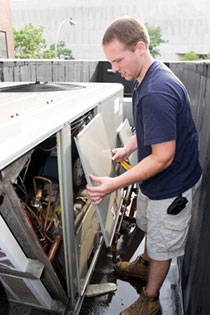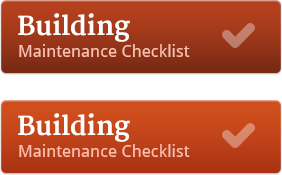 By time the snow melts and the days start getting warmer, homeowners are all too eager to do some spring-cleaning. After months of living with stuffy, dry air, the fresh air from outside is a welcome relief. It is easy to recognize the need for cleaning up the inside of our homes, but did you know the mechanical systems of your property can benefit from spring cleaning too?
By time the snow melts and the days start getting warmer, homeowners are all too eager to do some spring-cleaning. After months of living with stuffy, dry air, the fresh air from outside is a welcome relief. It is easy to recognize the need for cleaning up the inside of our homes, but did you know the mechanical systems of your property can benefit from spring cleaning too?
Heating and air-conditioning units need regular cleaning and maintenance to perform optimally. Owners of single-family homes are slightly more apt to understand this (but only slightly!) since they can see their compressor units every time they walk out into the yard. Owners of condominium units don’t have this visual cue and may be confused over whether HVAC maintenance is their responsibility or the responsibility of their association.
Who’s Responsible For Maintenance?
In general, condominium associations are responsible for the maintenance of “common” areas such as the exterior of the building, the landscaping, hallways and common rooms such as laundry facilities. If the mechanicals are shared, they are the responsibility of the homeowners association, but more often than not furnaces and air conditioners are not shared. Each unit has its’ own HVAC system. If this is the case, then the responsibility for maintenance of those mechanicals falls to the condo owner.
Spring Maintenance Tips
Once spring truly hits, we are eager to turn off the heat and enjoy a few months of “free” heating and cooling. It’s no longer cold enough to warrant running the furnace anymore, but it’s not so hot outside that we turn on the air conditioner. This in-between time is the perfect time to schedule a maintenance inspection and tune-up on your air conditioner and have your furnace checked for potential problems as well.
- Air Filters. One of the easiest things to check and something most property owners can do themselves is to check the filter. After months of constant use, your air filter can get pretty clogged up with dirt, dust and pet hair. Filters are easy to access and simply pull up so you can take a quick look and see for yourself if it needs to be replaced or not. Doing this while the unit is off, means the filter isn’t currently needed and gives you the time you need to make a replacement if need be. Depending on the type of filter you have, you can rinse it off and reuse it, replace it with a new one yourself or contact an HVAC maintenance company and order a replacement. If you don’t clean or replace your filter, it can force the HVAC system to work harder to get hot or cold air through your house and won’t be very effective at cleaning the air.
- Furnace Shut Down. There’s more to shutting down a furnace than moving the thermostat function from “Heat” to “Off”. A spring check of the furnace is a great time to have the unit professionally inspected for small cracks or damage that could cause problems when you need to start it up in the fall.
- Air Conditioner Check. The A/C can’t be checked until the furnace is shut down. There are some things you won’t be able to do on your own, like check the coolant levels and gauge the cooling function, but you can check around the unit for debris and clear it off. A quick hose down can clear out any leaves or small pieces of debris that may have fallen into the compressor unit over the year. Look for anything that could block airflow around the outside or on top of the unit and then clear it away.
- Hire a Professional. Hiring a professional HVAC installer or maintenance service will ensure your unit gets a thorough check-up and any minor adjustments or repairs made on the spot. Find out if your condo association works with a service provider or can arrange for a group inspection for owners who want to have their units checked. A routine inspection and tune-up shouldn’t cost more than $100 per unit, which is far less than you’d pay if you needed to have major repairs done.
Things To Keep In Mind
Remember, the tips presented here are maintenance tips to help make sure your HVAC system is operating at peak function. The true test of the A/C unit will come when there’s an actual load on the system. That is, when it’s hot outside and you need to cool off the inside of your home. Since tests on the system are typically done in the spring, before the weather gets too warm, you may not get an accurate read on the load capacity of your unit. Routine maintenance will, however, ensure the unit is in its best condition to meet that demand. You’ll be able to see if there are worn or broken parts that need to be replaced before you need to turn the unit on and you’ll have time to make the repairs before you’re sweltering in summer heat.
Routine maintenance will extend the life of your mechanicals, keep them operating at peak efficiency and save you from needing to make those emergency calls to an HVAC repair service at the height of summer’s heat or winter’s cold.



